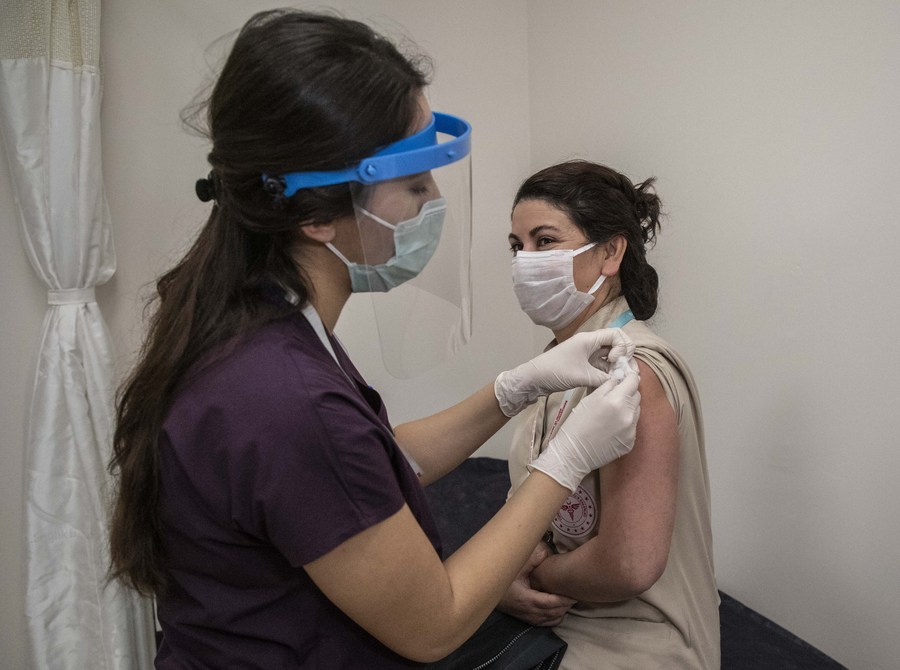
A health worker receives a dose of COVID-19 vaccine from China in Istanbul, Turkey, Jan. 14, 2021. (Photo: Xinhua)
On many occasions, China has expressed that it will make its COVID-19 vaccine a global public good when available, contributing to expanding vaccine accessibility and affordability in line with its vision of building a global community of health for all.
During the initial stage of the COVID-19 pandemic, when many countries first started to develop vaccine candidates, some of the more advanced countries with a longer history of developing and manufacturing vaccines had put forward high aims and high promises. To date, only a small handful of countries have developed vaccines after undergoing successful trials for human use. China’s Sinopharm vaccine was among the first to be recognized as both safe and effective.
The joint cooperation between Pakistan and China in the fight against COVID-19 has been exemplary since the start of the outbreak. Pakistan has remained steadfast in supporting China's global and regional initiatives aimed at defeating the virus.
Looking to the year ahead, China will continue to provide its COVID-19 vaccines to other countries, especially developing countries located in the Global South, doing so promptly within its capacity and contributing to building a community of health for all.
China donated its first batch of inactivated COVID-19 vaccines to Pakistan. It was the first consignment of vaccine aid provided by China to another country and a concrete step in honoring President Xi's pledge of making COVID-19 vaccines a global public good.
Vaccine cooperation is an integral part of the joint efforts by Pakistan and China to overcome COVID-19. It demonstrates the two countries’ sincere attempts at mutual assistance as all-weather strategic partners as well as their collective struggles as two developing countries to make vaccines a global public good and promote their accessibility and affordability among fellow developing nations.
Late last month, Pakistan's Foreign Minister, Makhdoom Shah Mahmood Qureshi, received a consignment of 500,000 doses of Sinopharm’s vaccine from the Chinese Ambassador to Pakistan, Nong Rong, at Nur Khan Airbase near Islamabad. The Foreign Minister thanked China's leadership and the Chinese people for sending the donation of Sinopharm vaccines in aiding Pakistan to combat the pandemic. He added that the vaccine had arrived exactly at a time when Pakistan was grappling with a second wave of the virus. Its delivery, which coincides with the commencement of celebrations of the 70th anniversary of the establishment of diplomatic relations between the two countries, reaffirmed the cherished legacy of China repeatedly standing by Pakistan’s side. It revealed that the Pakistan-China friendship is timeless and that China continues to remain Pakistan’s staunchest partner. The Foreign Minister also underlined that the recent Phase-III clinical trials for CanSino Biologics’ COVID-19 vaccine candidate had reached a successful conclusion in Pakistan. Moving forward, Pakistan aims to continue deepening its cooperation with China in matters relating to the roll-out of vaccines.
While ensuring a satisfactory domestic response, China has also actively participated in and promoted international cooperation in both a transparent and responsible way. China was the first country to report cases of the novel coronavirus to the world, releasing the genome sequence of the virus to the international community, along with diagnosis and treatment plans, and other critical information, having taken this step at the earliest time possible. It has taken various additional steps to help developing countries access life-saving vaccines. China will continue to work with the international community to continually advance areas of relevant cooperation and make a determined effort in achieving an early and complete victory over the pandemic.
Zamir Ahmed Awan is a senior fellow with the Center for China and Globalization (CCG) and a sinologist at the National University of Sciences and Technology in Pakistan.


